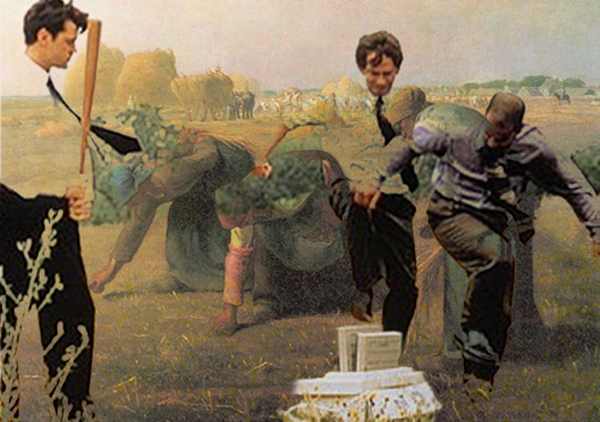Random
Workers in a Field

Jean-François Millet’s “The Gleaners” (1857) shows three peasant women gleaning a field after a harvest of crops, its depiction of the lower class most irksome to the French upper class, who didn’t want rural poverty and intimations of the 1848 French revolution in their Salon. I imagine artisanal cheese melting in their mouths and coursing straight to their hearts. Millet is just as known for “The Sower,” later copied by Van Gogh, and from which Simon & Schuster’s colophon is derived. Realism is used to describe Millet’s paintings, implying a kind of artistic integrity or moral clarity necessary for the unglamorous staunch view of the world; the problem is that Realism is also used to describe our later Renoir and Manet, whose pasty bourgeois subjects are safe from the sun under parasols and hands of shadows taught by the leaves above to protect the smiling faces. In fact, from the field to the park, the real R-word is Romantic, the aesthetically adroit projection of an ethos by which the lesser, us, learn to live. In 1999, three actors were allowed to do what they, likely with grim office jobs themselves in their past before said success, had, like us, fantasized doing. They were told to walk into a field subconsciously on the perimeter of an office building and destroy a fax machine with only their feet, fists, and one bat. They took turns with the bat, a phallic democracy both homoerotic and most American. Directer Mike Judge (Office Space, Beavis & Butthead), whose genius shall not be argued here, later added a Geto Boys song as an ironic, and mildly racist, “juxtaposition” to the whiteness of their white collar plight and excised rapture. When faceless bureaucracies are embodied by the broken means meant to convey them, it’s time to freak out. That a fax from afar is printed on recipient paper and not the sender’s is often forgotten, with people getting angry at the sender for being out of paper. The age of reason is now unreasonable. To come full circle is to start all over again, and I sometimes wonder if I’d be happier before the industrial revolution. I’d have strong arms, a nice tan, and no tweets to worry about. If the reader does not know where this is headed, may he or she be pointed outside, to workers in a field, whose very work seems futile but is somehow necessary in small unseen ways, from flax to fax, of horrible jobs existing for a reason, of civilization moving along slowly, before the sun sets, through near darkness and its nightly requiem of crickets, until it rises again.

beautiful piece. but don’t fool yourself – workin’ on a farm sucks bro. as would living in any century before anesthetic.
O God! methinks it were a happy life,
To be no better than a homely swain;
To sit upon a hill, as I do now,
To carve out dials quaintly, point by point,
Thereby to see the minutes how they run,
How many make the hour full complete;
How many hours bring about the day;
How many days will finish up the year;
How many years a mortal man may live.
When this is known, then to divide the times:
So many hours must I tend my flock;
So many hours must I take my rest;
So many hours must I contemplate;
So many hours must I sport myself;
So many days my ewes have been with young;
So many weeks ere the poor fools will ean:
So many years ere I shall shear the fleece:
So minutes, hours, days, months, and years,
Pass’d over to the end they were created,
Would bring white hairs unto a quiet grave.
Manet was mocking the Romantic painting trope of fauns or cultured people appreciating poetry in the rugged wild. Manet’s mark-making is deliberately crude and the people lounging in the park are gauche bohemians (proto-hipsters?).
Loved the end. Felt affinity with subject. Nice photoshoppin’
ponyurl.com/bp52t5
goo.gl/tX8v0
tinyurl.com/can5hdg
goo.gl/tX8v0